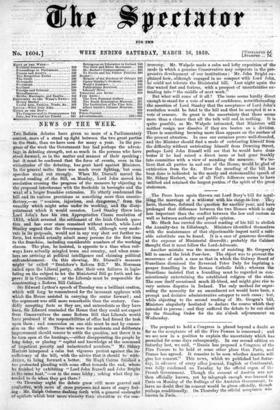NEWS OF THE WEEK.
THE Reform debates have given us more of a. Parliamentary -contest, more of a stand up fight between the two great parties in the State, than we have seen for many .a year. In the pro- gress of the week the Government. has had perhaps the advan- tage in debating strength, not so much in the persons who have stood forward, as in the matter and manner of their speaking ; but it must be confessed that the force of events, even in the vicissitudes of the debating, has gone hard against Ministers. In the general melee there was much "cross fighting, bat- some speeches stand out strongly. When -Mr. Disraeli moved. the second reading of the Bill, on Monday, Lord John moved his resolution crossing the progress of the measure.by'objecting to the proposed. interference with the freeholds in boroughs and the want of a larger franchise extension. He utterly condemned the bill and its various provisions as something more than unsatis- factory,—as " noxious, injurious, and dangerous," from the venality which might arise under its working, and the disap- pointment which it would. occasion. Lord Stanley threw into _Lord John's face his own Appropriation Clause resolution of 1835, which arrested the settlement of the Irish Church ques- tion and has ever since remained without result, while Lord Stanley argued that the Government bill, although very mode- -rate in its proposals, would not in any way shut out further re- form, but would actually admit many persons for the first time to the franchise, including considerable numbers of the working -classes. The plan, he insisted, is apposite to a time when rail- ways have actually mingled town and country, and when num- bers are arriving at political intelligence and claiming political enfranchisement. On this showing, Mr. Disraeli's measure might be called " Bradshaw's Reform Bill." Mr. Horsman called upon the Liberal party, after their own failures in legis- lating on the subject to let the Ministerial Bill go forth and im- prove it in Committee ; or the Liberals must be responsible for .constructing a Reform Bill Cabinet.
Sir Edward Lytton's speech of Tuesday was a brilliant oration, which will long be remembered for the incessant applause, with which the House assisted in carrying the orator forward; and the argument was still more remarkable than the oratory. Can- lidly accepting facts as they are, and antecedents as they have been, Sir Edward reminded the House that they could not expect from Conservatives the same Reform Bill that Liberals would have produced if the responsibilities of office had forced the task upon them ; and concession on one side must be met by cones- sign on the other. Those who were for moderate and deliberate improvement should concur to settle the question, not throw it to be torn open at the hustings,—either disappointing the people by long delay, or placing " capital and knowledge at the command of impatient poverty and uninstructed numbers." Mr. Sidney Herbert interposed a calm but vigorous protest against the. in- sufficiency of the bill, with the advice that it should be. with- drawn, to bring forward a better. Sir Hugh Cairns finished too protracted pleading with some effect towards the end, where he finished by exhibiting " Lord John Russell and John Bright in the same boat,"—or in the same lobby ; asking what they in- tended to do when they got there ?
On Thursday night the debate grew still more general and combative, with more of cross purposes and more of angry feel- ing ; Mr. Ralph Osborne dashing forth with a general onslaught of epithets which lent more vivacity than elevation to the con- .troyersy.. Mr. Walpole made a calm and lofty exposition of the mode in which a genuine Conservative may cooperate in- the pro- ireisiie development of our institutions ; Mr. John Bright ex- plained how,-although engaged in no compact with' Lord John, he could not tolerate the Ministerial bill. Last night again the fun:waxed fast and furious, with aprospect-of uncertainties ex- tending into " the middle* of next week." But what will come of it all ? The issue seems hardly direct enough to stand for a vote of want of confidence, notwithstanding the assertion of Lord Stanley that the acceptance of Lord. John's resolution would be fatal to the bill and that he accepted it as a .vote'Of Censure. So great is the uncertainty that :there seems mole -than a chance that all the talk will end in nothing. It is -quite possible, as Mr. Walpole intimated, that Ministers. will neither resign 'nor dissolve if they are beaten on a division. There is something brewing more than appears on the surface of the present situation. In case our surmises prove eiell-founded, Una the.Minister should find a mode of extricating himself from the-difficulty .without extricating himself from Downing Street, perhaps Lord John Russell will see ' that he would have done better if he had raised a direct issue or had gone frankly into.committee with a view of mending the measure. We be lieve that all parties in and out of the House, would be.glad of extrication from the fix. How the mending of the bill_ has been done is indicated in the manly and statesmanlike speech of Mr. Sidney Herbert, who of all Peel's followers seems to have imbibed and retained the largest portion of the spirit of the great statesman.


























